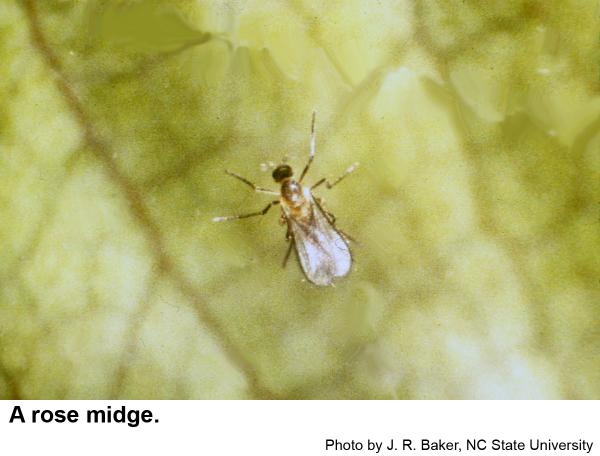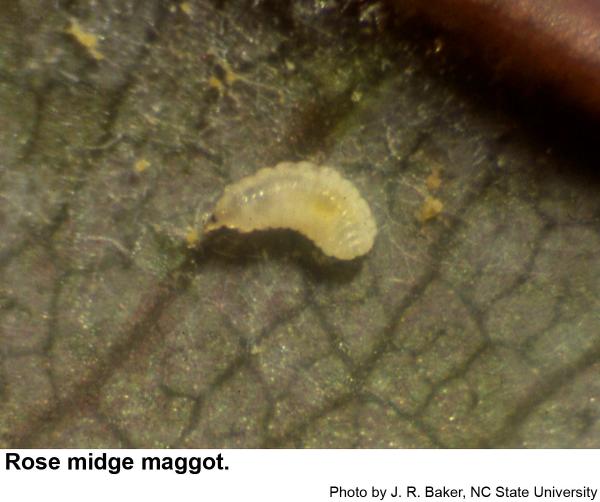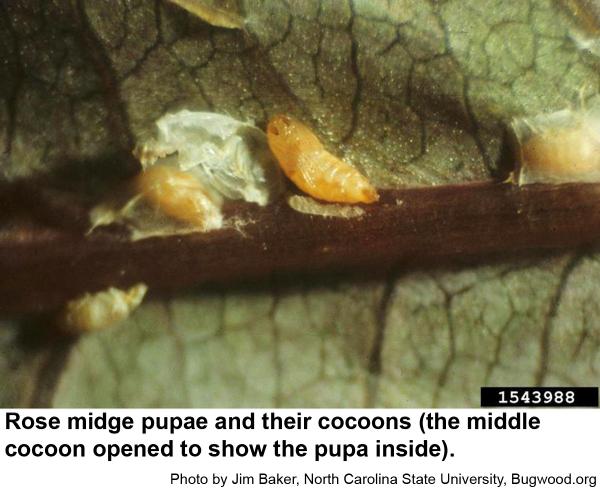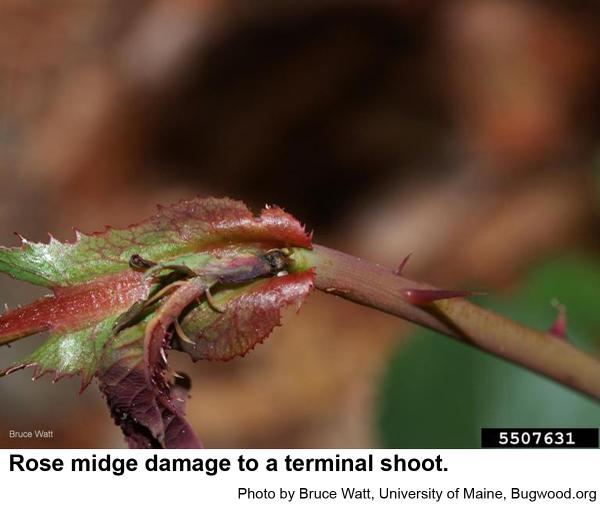Description and Biology
Rose midge, Dasineura rhodophaga, is an uncommon but damaging pest of roses. Rose midges are dark, mosquito-like flies and are very, very small and delicate. They live for only 1 or 2 days. Rose midges emerge from pupae in the soil early in the spring about the time roses start their new growth. Adult midges mate, and females lay eggs inside the sepals of new flower and leaf buds. Tiny, white maggots hatch and feed in these areas causing distorted flower buds and tips that blacken and abort. We sometimes have two peaks of damage; one in late June and another inlate August. Within 2 days eggs hatch and the emerging maggot begins feeding inside leafy tips and flower buds. This goes on for 5 to 7 days until the 1/16 to 3/32 inch long, mature maggots drop to the soil and pupate inside a flimsy, white, silken cocoon beneath the soil surface (although some pupae have been observed in damaged rose tips). The last generation overwinters in the ground in cocoons and a new generation of midges emerge the following spring. The first signs of rose midge damage is minimal in early spring, but damage acrues during the summer until rose midge injury may be quite severe. This insect completes one life cycle every 12 to 16 days ̶ the warmer the season, the shorter the cycle. Damage to the new rose growth results in the complete loss or distortion of rose buds that blacken and wither. We have several generations per year in North Carolina.
Host Plants
Rose, particularly hybrid tea types, seem to be the only host plants of rose midges. Developing flower buds are usually killed or distorted by this injury. "Blind" shoots, where no flower buds appear to form may also be the result of rose midge damage.
Residential Recommendations
Once rose midges infest a garden, they can be difficult to eradicate. For those not willing to apply insecticides, infested plantings should be examined every few days and all damaged buds trimmed, removed, and destroyed. Applications of insecticides that linger in the soil for long periods such as imidacloprid are mostly effective because they kill the maggots as they drop to the soil to begin development into adults. This is not fail-safe, because some maggots spin cocoons and pupate inside infested leaves and buds. Sprays applied to infested bushes kill on contact but require precise application timing.
Other Resources
- Rose Midge. Hefner, J. 2018. Indianapolis Rose Society, Growing roses and growing friends.
- Rose Midge. Rosetta, R. L. 2019 (update). Extension Nursery Integrated Pest Management, Department of Horticulture, Oregon State University.
- Extension Plant Pathology Publications and Factsheets
- Horticultural Science Publications
- North Carolina Agricultural Chemicals Manual
For assistance with a specific problem, contact your local N.C. Cooperative Extension center.
This Factsheet has not been peer reviewed.
Publication date: April 9, 2019
Reviewed/Revised: Feb. 15, 2024
Recommendations for the use of agricultural chemicals are included in this publication as a convenience to the reader. The use of brand names and any mention or listing of commercial products or services in this publication does not imply endorsement by NC State University or N.C. A&T State University nor discrimination against similar products or services not mentioned. Individuals who use agricultural chemicals are responsible for ensuring that the intended use complies with current regulations and conforms to the product label. Be sure to obtain current information about usage regulations and examine a current product label before applying any chemical. For assistance, contact your local N.C. Cooperative Extension county center.
N.C. Cooperative Extension prohibits discrimination and harassment regardless of age, color, disability, family and marital status, gender identity, national origin, political beliefs, race, religion, sex (including pregnancy), sexual orientation and veteran status.




